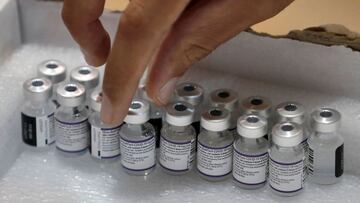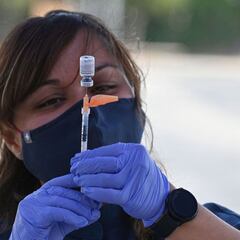Is the booster shot the same as the first shot?
Booster vaccines have been recommended by health officials and medical experts to counter the spread of the Delta variant before a winter peak.


Booster shots will be available from September 20 and will be available for those who had their final dose more than eight months prior. Initially, this will likely include older Americans and people most at risk from dying of the disease who received their jabs early in the vaccine rollout.
What booster shots will be available?
Initially, all booster shots will be of the same vaccine that the recipient initially received. Only Pfizer and Moderna will have booster vaccines as the testing for the J&J vaccine is not yet completed.
The U.S. government plans to make COVID-19 vaccine booster shots widely available starting on Sept. 20 as infections rise from the coronavirus Delta variant, Surgeon General Dr. Vivek H. Murthy said https://t.co/WIERcsTA52 pic.twitter.com/PMDUoe7ibg
— Reuters (@Reuters) August 18, 2021
Will this change in the future?
As continuous tests are done on the vaccines, there is a chance in the future that a mix-and-match approach will be in place. This is because there is a possibility that vaccines may need to be altered to counter a new variant.
If it is found that mixing vaccines has a beneficial outcome for protection then this approach may be considered, says US Surgeon General Dr Vivek Murthy.
Why are booster shots recommended?
According to the latest official studies, Pfizer’s vaccine immunity efficacy drops to 84 percent after four to six months after a final dosage. Conversely, Moderna doses manage to remain at 93 percent effectiveness after a six-month period.
A statement signed by several health authorities including CDC Director Rochelle Walensky, FDA Commissioner Janet Woodcock and White House chief medical advisor Anthony Fauci corroborates the latest study results.
“Based on our latest assessment, the current protection against severe disease, hospitalization, and death could diminish in the months ahead, especially among those who are at higher risk or were vaccinated during the earlier phases of the vaccination rollout,” said the statement.
New CDC study shows that #COVID19 vaccines continue to strongly protect against hospitalization. Vaccine effectiveness against mild or moderate infections may wane over time. Get vaccinated to protect from severe disease. https://t.co/8QfEC7jl3h pic.twitter.com/Ac48L5M9wH
— CDC (@CDCgov) August 18, 2021
The Delta variant has also been proven to knock down the efficacy of vaccines, especially Pfizer's. In January, it had an effectiveness of 85%, but by July, when Delta was the dominant strain, the efficacy had dropped to 42%. Over the same period, the Moderna vaccine only dropped to 76%. In total, the study used testing data of 37,573 recipients of the Pfizer vaccine and 35,902 of Moderna.
Related stories
To combat this lowering of protection, Pfizer conducted tests for a booster dose and the results were five times higher protection in adults aged up to 55. For older age groups, the third dose could provide 11 times more protection against the Delta variant.
Related news:
- What does FDA approval for the Pfizer covid-19 vaccine mean?
- Will booster shots be needed to travel? Do vaccines have an expiration date?
- Coronavirus US: when can children under the age of 12 get vaccinated?
- US Health Officials say covid-19 vaccine boosters to come in September
- Why might vaccinated Americans need a booster shot?
Who should get a booster shot?
The CDC is urging people with the following conditions to consider receiving a second (Jansen) or third (Moderna and Pfizer & BioNTech). This includes those who:
- Have recently received treatment for cancerous tumors or cancers of the blood,
- Take medication, such as corticosteroids, to suppress their immune system because they have received an organ or stem cell transplant,
- Have a “moderate or severe primary immunodeficiency,”
- Are HIV positive and are not currently receiving treatment or suffer from an advanced case.

